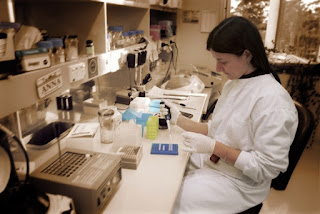DNA Storage Still Lacking
DNA is an exceptionally complex and important molecule, so much so that Bill Gates said that is is "far more advanced than any software ever created." He knows something about computer programming. It is in our nature to learn the workings of the Master Engineer.
The specified complexity of this molecule, its importance to life, and relationships to other cells is amazing. To claim it is the product of mindless evolution is risible. Scientists have been making progress in sequencing genomes, and DNA is being developed for data storage.
 |
| Anna Raicevic prepares DNA fragments Credit: CSIRO / North Sullivan Photography (CC BY 3.0) (usage does not imply endorsement of site contents) |
As it stands, digital data occupy hard drives stacked in stadium-sized exabyte data centers that cost a billion dollars to build and run. DNA appeals as a more stable and, someday, cheaper data storage vehicle, excepting one important hurdle: how to retrieve that needle in a DNA stack.In an ingenious feat, researchers from MIT and NC State crafted a way to organize and retrieve DNA—the most information-dense data storage medium in the universe.
To read the rest of this short article, see "Latest DNA Tech Still Light-Years Behind".